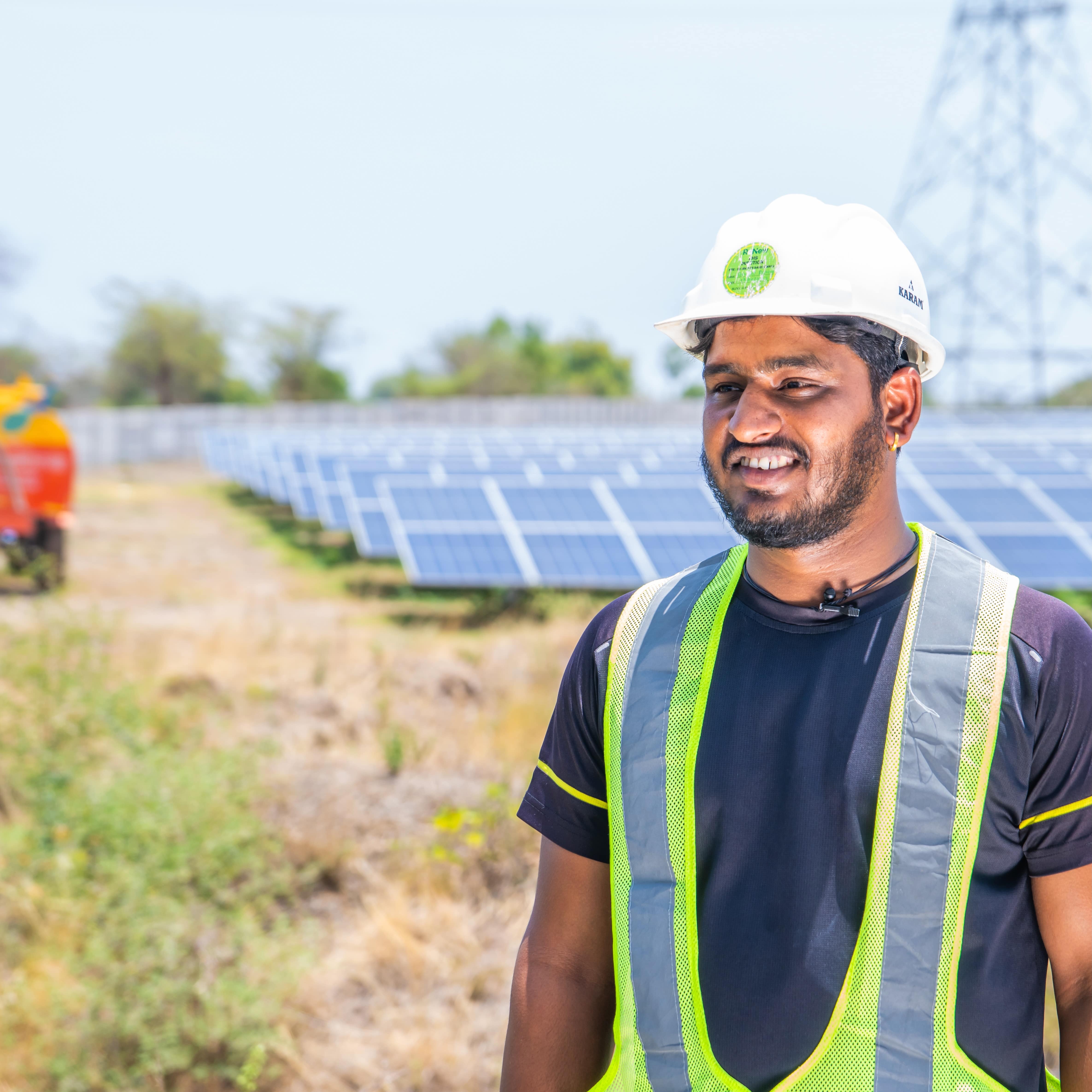Renewable Energy Revolution
India and Germany are driving the transition to a renewables based future. Learn how both countries are collaborating to transform energy systems and shape a clean and green tomorrow.

Ensure healthy lives and promote well-being for all at all ages.

Achieve gender equality and empower all women and girls.

Ensure access to affordable, reliable, sustainable and modern energy for all.

Promote sustained, inclusive and sustainable economic growth, full and productive employment and decent work for all.

Build resilient infrastructure, promote inclusive and sustainable industrialization and foster innovation.

Reduce inequality within and among countries.

Take urgent action to combat climate change and its impacts.
Just Energy Transition is about shifting from fossil fuels to renewable energy in a way that ensures fairness, equity, and inclusion, particularly for workers, communities, and regions that historically depend on fossil fuels for their livelihoods. It emphasises transforming energy systems to the use of renewable sources while protecting vulnerable groups, creating green jobs, and addressing social and economic inequalities during the transition. This requires, among others, massive investments into production capacities, grids and storages. In addition, the costs of the non-beneficiaries of a Just Energy Transition are to be catered for.
To protect the climate while ensuring energy security, India has committed to achieving Net Zero by 2070 and 50% cumulative electric power capacity (500 GW) installed from non-fossil fuel-based energy resources by 2030. This transition will require significant structural changes in the energy sector, namely the whole energy infrastructure and ecosystem. At the same time, new economic and industrial opportunities are opening. With joint initiatives, India and Germany ensure that the benefits of this transition reach everyone.
Germany is committed to become climate neutral by 2045 at the latest. This requires to abandon fossil fuels for electricity production. Therefore, Germany’s goal is an 80 % renewable energy share of gross electricity demand by 2030. As in India, there are many communities in different parts of the country which are or had been dependent on the coal industry for several generations and can benefit from a just energy transition. Therefore, both countries face similar social challenges beyond the transformation of energy systems itself.
The Just Energy Transition aligns closely with the SDGs and the Paris Agreement, emphasising fair and inclusive climate action. It supports SDG 7 (Affordable and Clean Energy) by ensuring access to sustainable energy for all. It contributes to SDG 8 (Decent Work and Economic Growth) by promoting economic growth and creating jobs in the renewable energy sector. By distributing transition benefits and costs equitably, it supports SDG 10 (Reduced Inequalities). Additionally, it is key for achieving SDG 13 (Climate Action) and the Paris Agreement for limiting global warming to well below 2°C by radically reducing GHG emissions. It supports Nationally Determined Contributions (NDCs) by ensuring climate actions are fair and inclusive. It also aligns with the agreement’s call for financial and technological support to developing countries, ensuring all have the resources for an equitable shift to clean energy.
Germany therefore cooperates with India in support of the Indian Energy Transition in multiple spheres: investments for generation capacities (solar, hydropower), support to green energy corridors (transmission lines), distribution companies, innovative applications, digitalization in the energy sector, storage, around-the-clock availability of renewables, decarbonization of hard-to-abate sectors, e-mobility, and public transport. The cooperation pays special attention to the inclusion of women as beneficiaries and drivers of the energy transition.
Under the GSDP, both countries are lifting their cooperation to a new level, gathering all bilateral activities under a joint umbrella. India and Germany have been cooperating in the energy sector since 2006 under the Indo-German Energy Forum (IGEF). IGEF is a dialogue platform for high-level policy makers, financial institutions, industry and research organizations to deepen and enhance the bilateral cooperation for the energy transition in India and Germany. The forum aims to enhance energy security, support climate action, and drive the transition to a low-carbon economy by leveraging the strengths and expertise of both countries. For that purpose, it focuses on promoting private sector activities and putting in place an enabling environment in areas such as renewable energy, energy efficiency, green energy financing and grid integration. Conference formats such as the Indo-German Platform for Investments in Renewable Energies Globally at the Indian RE-INVEST 2024 shall further strengthen the ties between the German and Indian private sector in the field of renewable energy – building on existing formats and adding new elements to them.
India and Germany established a Green Hydrogen Task Force in 2022. This task force aims at enhancing bilateral cooperation in the production, utilisation, storage, and distribution of green hydrogen. The task force creates enabling frameworks for projects, regulations, standards, trade, as well as joint research and development.
In addition, both countries renewed their commitment for the Indo-German Renewable Energy Partnership. Under this partnership, India and Germany are advancing solar and wind power, energy efficiency, grid integration, and policy frameworks. It aims to exchange knowledge and technology, promote investment, and drive innovation in sustainable energy.
As working on a just energy transition also means adopting a global perspective, India and Germany are partnering to drive the renewables revolution around the world. As part of the International Solar Alliance (ISA), both countries are working together to bring solar technology solutions to countries around the world.
Through financial support, cooperation on technology transfer, and capacity building, India and Germany are accelerating the adoption of renewable energy, enhancing energy efficiency, building green grids, and developing a skilled workforce for renewables manufacturing and deployment.

